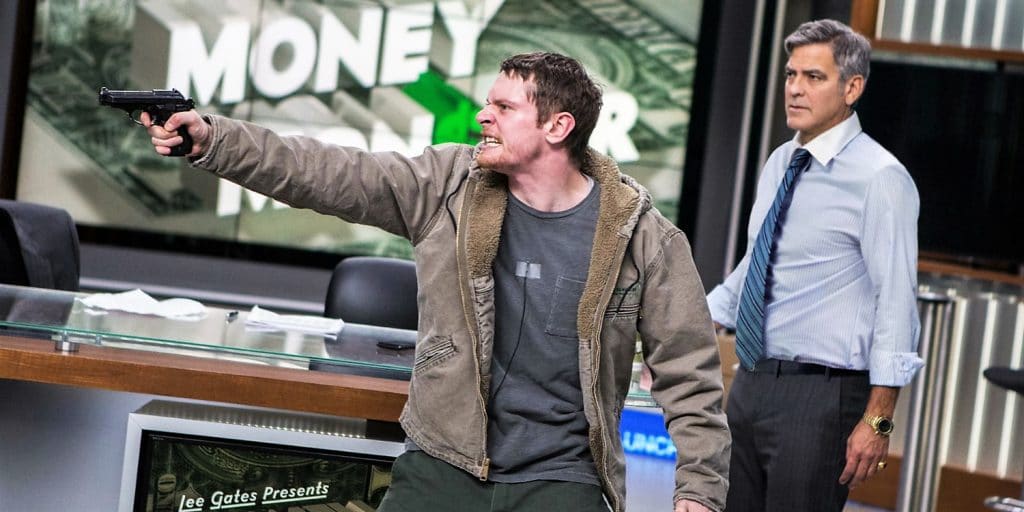Hugely entertaining and well acted, Money Monster keeps us on the edge of our seats with a tense plot, although it also becomes too implausible
Money Monster (2016)
Directed by Jodie Foster. Screenplay by Alan Di Fiore, Jim Kouf and Jamie Linden. Story by Alan Di Fiore and Jim Kouf. Starring George Clooney, Julia Roberts, Jack O’Connell, Dominic West, Giancarlo Esposito and Caitriona Balfe.
Directed by Jodie Foster and screened out of competition at the 2016 Cannes Film Festival, Money Monster is a strange animal. It received mixed reviews from critics — which is understandable considering how it feels a bit simplistic when dealing with its themes — but earned enthusiastic praise from the audience, which is fair since the film is quite good and effective, all things considered. The only problem is that it starts to become more and more implausible in its second half, making us think that it may be a lot more naïve than its subject would let us imagine.
Written by no less than six hands and with a title that couldn’t be more obvious, Money Monster seems like a modern dumbed-down Sidney Lumet movie — a Network (1976) of our times as far as TV sensationalism is concerned. George Clooney plays financial guru Lee Gates, who hosts his TV show Money Monster and is in the midst of airing it when a furious man called Kyle Budwell (Jack O’Connell) invades the studio, takes Gates hostage and forces him to wear a vest full of explosives. Kyle claims that he invested his entire life savings of $60,000 on a stock company that Lee endorsed a month before on his show, but the company collapsed due to a certain “glitch” in an algorithm that cost $800 million to investors. Now, as the guy wants answers, Lee and his longtime director Patty Fenn (Julia Roberts) need to find them before Kyle does anything reckless.
With an effective beginning that keeps the action confined to a TV studio as we follow a tense hostage situation, Foster shows us once more her talent behind cameras after The Beaver (2011), this time to build suspense and keep us on the edge of our seats almost the whole time — especially when it is all a matter of “unpressing” the button of the detonator of the bomb’s vest (Kyle has to keep his finger pressing the button or else it goes off). The skillful editing makes everything quick and dynamic right from the first scene, helping maintain a sense of urgency that is essential to make us care about the safety of Clooney’s character while letting us wonder about the identity of a Korean man, two Icelandic guys and some South Africans who show up without much warning on the screen.
But none of this would work if it weren’t for the film’s excellent performances. Clooney is at his most talkative and eccentric as a TV comedian, and the way he delivers his lines sounds insanely surreal sometimes (“Your money better be fast!”). In fact, his character is so clueless about the rest of the world that he even makes us pity him when we learn the answer to his question “What’s my life worth?” as he pleads with his audience to save his life. And we also understand why he feels so compelled to help Kyle after he begins to grasp the reasons behind the young man’s anger — it doesn’t really explain how far all this gets in the second half, but Clooney does his best to sell that.
Likewise, Julia Roberts offers a welcome contrast to Clooney’s character, communicating with him from a distance and using rational decisions and a lot of wit to prevent this crazy situation from going off the rails — and it is a real surprise to know that Roberts and Clooney didn’t work so much together in this movie due to scheduling reasons and that her scenes were shot with a green screen over those TV monitors placed before her. Meanwhile, Jack O’Connell continues to prove to us how talented he is after shining in Starred Up (2013) and ‘71 (2014), injecting so much energy and intensity into his performance that we end up feeling deeply sorry for his character’s tragic situation, made even more devastating by a humiliating (and hilarious) scene involving his pregnant girlfriend.
The rest of the cast includes Dominic West as the elusive CEO of IBIS stock company Walt Camby, who is apparently nowhere to be found, and Caitriona Balfe as IBIS chief communications officer Diane Lester, who has no idea what provoked the “glitch” but decides to find the truth by contacting the programmer who created the algorithm. What Lester discovers is an interesting twist that exposes the driving ambition of the capitalist system and how people with money will stop at nothing in their desire for profit.
And it is precisely because of the film’s good intentions that it is disappointing to see Money Monster become so implausible (or should I say stupid) in its second half, when the police choose an absurd solution for a hostage situation and the action moves to the streets. In a way, this dilutes the strength of the political commentary it wants to make, even if it’s not such a clever and insightful commentary in the first place. Still, the movie is hugely entertaining and well-acted enough to be worth our time.





